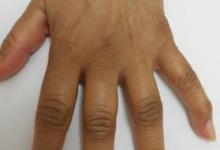ACR 2016 – Day 1 Highlights Save

The annual ACR meeting began last night with a number of famed rheumatologists being inducted as ACR Masters, including Drs. Philip Mease, Lynn Punaro, Olufemi Adelowo, Hans Bijlsma, Lenore Buckley, Jeffrey Callen, Luis Catoggio, Joseph Craft, Bruce Cronstein, Chad Deal, Jim Engelbrecht, Peter Gregersen, John Harley, David Isenberg, Daniel Kastner, Lynell Klassen, Ted Lally, Daniel Lovell, Alberto Martini, Fred Miller, Rodolfo Molina, Martin Rodriguez, James Rosenbaum, Christy Sandborg, and Carter Thorne.
In addition, the Presidential Gold Medal Award, the highest award bestowed by the ACR, went to David Pisetsky, MD, PhD from Duke University to recognize his outstanding career in research, teaching, patient care and more. Dr. Pisetsky is a truly talented writer as well.
There were tons of poster and hours of oral sessions that were noteworthy, but here are a few of my top picks from today’s proceedings
- GiACTA study (Abstract 911): is the largest randomized controlled trial of a drug in giant cell arteritis (GCA). Over 250 patients received either 2 different steroid regimens or 2 different tocilizumab (TCZ) regimens. In the end, 4-fold greater responses were seen in those who received either weekly or every other week TCZ therapy. Moreover, a significant steroid sparing effect was seen. Dr. John Stone who presented this data declared in the end, “there is something new in GCA”. Meaning we may soon have alternative effective regimens that can minimize steroid dependence.
- Statins in PsA/AS: Another plenary session presentation (Abstract #910) from the MGH examined the effect of statin therapy on all-cause mortality. They showed that 2 years of therapy was associated with a 32% reduction in mortality and CV mortality.
- faSSinate study extension data. This phase II trial of tocilizumab in patients with systemic sclerosis (SSc) has already been published in The Lancet in early 2016. Eighty-seven patients with progressive SSc were randomly given either weekly subcutaneous tocilizumab 162 mg (n=44) or placebo (n=43) for 48 weeks, followed by open-label weekly tocilizumab for 48 weeks. The study did not meet its primary endpoint, which showed a non-significant trend towards improvement in the modified Rodnan Skin Scores (mRSS) skin scores at 24 weeks. Yet there was a meaningful decline in mRSS over 48 weeks was seen in the TCZ group compared with the placebo group. Moreover, tocilizumab-treated patients had less decline in lung function compared to patients on placebo. In the 48-week extension study they showed that skin scores declined from week 48 to 96 but did plateau in the TCZ group and the initial placebo population crossed over to receive TCZ and showed the same progressive decline and even caught up to the TCZ throughout group at week 96. There were no new safety signals identified. This agent was given “breakthrough” status by the FDA, which means its review will be expedited. But the drug is not approved and additional larger clinical trial data is need before regulatory approval can proceed.










If you are a health practitioner, you may Login/Register to comment.
Due to the nature of these comment forums, only health practitioners are allowed to comment at this time.